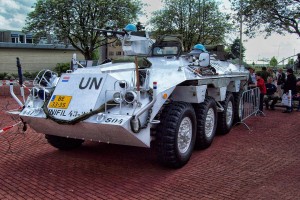
New York: After the January 18, 2021 attack in which two UN peacekeepers — one from Gabon and one Morocco — were killed near Bangassou, in the Mbomou prefecture, by alleged combatants from the Coalition of Patriots for Change, the CPC, the security situation remains fragile throughout the Central African Republic. According to the UN peacekeeping mission on the ground, they continue to maintain a robust posture to ensure the protection of civilians.
While the members of the Security Council has condemned the attack against the Multidimensional Integrated Stabilization Mission in the Central African Republic (MINUSCA) near Bangassou, which resulted in the deaths of the two peacekeepers, they reiterated that attacks against peacekeepers may constitute war crimes and reminded all parties of their obligations under international humanitarian law. They called on the Government of the Central African Republic to swiftly investigate these attacks and bring the perpetrators to justice.
The United Nations Secretary-General António Guterres, who expressed grave concern over the escalation of violence in the Central African Republic, on January 19 called on all parties to immediately cease hostilities, to engage in dialogue to advance the political process, preserve fragile gains and fulfil the country’s aspirations for lasting peace.
On January 18, 2021, Jean‑Pierre Lacroix, the head of Peace Operations, had joined senior officials from the African Union, the Economic Commission of Central African States (ECCAS) and the European Union, in issuing a joint statement. The statement took note of the decision of the Central African Constitutional court, which proclaimed the final results of last month’s presidential election. In their joint statement, they called on all actors to accept the results of the elections as certified by the Court, and reaffirmed their commitment to political dialogue, the consolidation of peace and democracy.
“The United Nations Multidimensional Integrated Stabilization Mission in the Central African Republic (MINUSCA) will continue to provide its multifaceted support to complete the electoral process, particularly the legislative elections,” Stéphane Dujarric, Spokesman for the Secretary-General, told media persons on January 19.
Already this year, nine United Nations peacekeepers have been killed in hostile incidents around the world. On January 15 too, an attack perpetrated against the United Nations Multidimensional Integrated Stabilization Mission in Mali (MINUSMA) near Tessalit in Kidal region, had resulted in one peacekeeper from Egypt killed and another one seriously injured.
These attacks do demonstrate the perilous environment in which peacekeepers carry out their mandates to protect people and support peace processes — tasks made harder by the global pandemic. “While progress has been made in reducing casualties among United Nations peacekeepers, recent incidents show that the threats continue,” Guterres said.
“It’s an extremely heavy toll. We, sadly, have had incidents where more peacekeepers were killed in one incident, but we’re seeing here a repeated number of different incidents, both in Mali and in the Central African Republic, and I think these tragedies underscore the sacrifice that peacekeepers make every day, when they go out… It also underscores the need for those involved in political talks to actually make progress, right, to actually ensure that there is peace and that, when agreements are signed, agreements are respected. Our collective efforts to ensure the safety of peacekeepers, including through the Action for Peacekeeping initiative, need to keep pace,”Dujarric said.
Dujarric added that while the UN was always looking at force protection improvements to increase the safety of peacekeepers, “Unfortunately, the people we are dealing with are also improving their methods”. He said a big effort was made in the last few years, especially in protecting peacekeepers from improvised explosive devices, which had been sort of the weapon of choice, especially in Mali, and there were improvements in equipment. “Number of the fatalities, I think, had gone down. So, we are always looking on how to improve the security,” he said but added that the best way to ensure the security of peacekeepers was for all the parties involved to show the willingness to find a peaceful resolution to the conflict, to find a political way forward, and to put down their guns and to stop laying down explosives along a road that kills peacekeepers who are there to protect people and to bring peace and solace to the population.
– global bihari bureau





